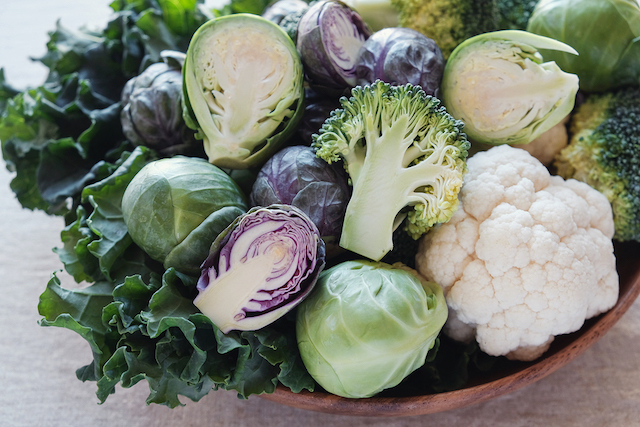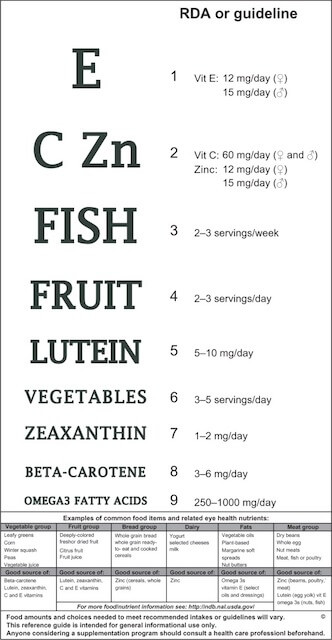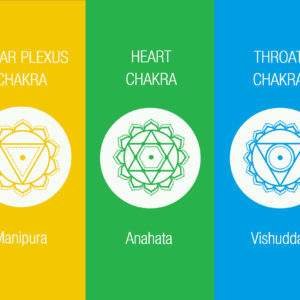Our eyes are very complex organs that we rely on pretty much every waking moment of the day. Most people don’t give the health of their eyes much thought until something goes wrong. Common conditions, such as chronic dry eyes, age-related macular degeneration, glaucoma and cataracts, can impact your eyes. Though a variety of different factors contribute to these conditions, nutrition seems to have an influence on all of them. Here are 6 important vitamins for eye health.
Vitamin E
Vitamin E is actually a term for eight fat-soluble antioxidants: four tocopherols (α-, β-, γ-, and δ-) and four tocotrienols (α-, β-, γ-, and δ-). The most common form utilized by the body is α-Tocopherol. The primary function of α-tocopherol in humans is that of an antioxidant.
Our cell membranes are composed of fats. These fats are vulnerable to destruction through oxidation by free radicals. α-Tocopherol attacks the free radicals to protect our cells. When it comes to eye health, this is especially important because the retina contains a large concentration of fatty acids.
α-tocopherol is kind of like a bee in that it loses its antioxidant capacity when it neutralizes a free radical. However, vitamin C comes to the rescue and actually regenerates α-tocopherol so it can continue attacking free radicals.
Some sources of vitamin E:
- Vegetable oils, such as wheat germ, sunflower, and safflower
- Nuts and seeds, such as almonds, peanuts, hazelnuts, Brazil nuts, and sunflower seeds
- Green leafy vegetables
- Fish, especially salmon and trout
Vitamin C

In the body, vitamin C is required for the synthesis of collagen, a structural component of blood vessels, tendons, ligaments, and bone. Vitamin C is also a powerful antioxidant. Its primary role is protecting essential molecules in the body from damage by free radicals and reactive oxygen species, which are generated during normal metabolism as well as from exposure to toxins in our environment. Because the eye has a particularly high metabolic rate, it has an increased need for antioxidant protection. In the eye, vitamin C may also be able to regenerate other antioxidants, such as vitamin E.
Some sources of vitamin C:
- Blackberries and blueberries
- Cruciferous vegetables, including broccoli, cauliflower, cabbage, and Brussels sprouts
- Leafy green vegetables
- Citrus fruits
- Red and green peppers
- Potatoes (both sweet and white)
β-Carotene
β-Carotene is an orange pigment commonly found in fruits and vegetables. It is a carotenoid that provides a vital source of provitamin A. In the body, provitamin A is converted into retinol, or vitamin A, which serves many important roles in the eyes, including protecting against macular degeneration.
Some sources of vitamin β-Carotene:
- Carrots
- Sweet potatoes
- Apricots
- Squash
- Dark leafy greens, such as kale and spinach
- Cantaloupe
- Red and yellow peppers
Other Carotenoids
Lutein and zeaxanthin are other carotenoids necessary for eye health. These are not involved in vitamin A synthesis, but support the eyes in a different way. These two carotenoids are concentrated in the macular region of the retina and protect this portion of the eye from oxidative stress.

As we age, the macula portion of the eye degenerates as a result of exposure to light. Sunlight used to be the worst type of light for eyes, but today our eyes have to contend with exposure to more than just UV lights. Blue lights from electronics and LED lights can cause even more harm than sunlight. As the only carotenoids found in this portion of the eye, lutein and zeaxanthin play a very important role in protecting the eyes.
Some sources of Lutein and Zeaxanthin:
- Marigold flowers
- Green leafy vegetables, especially kale and spinach
- egg yolks
- Maize (corn)
- Orange peppers
- Kiwi
- Grapes
Zinc
As an essential constituent of many enzymes in the eyes, zinc is important for maintaining optimal health of the retina as well as healthy metabolism of the eye.
Some Sources of Zinc:
- Nuts, such as almonds, cashews, and peanuts
- Meat products (beef, chicken, pork, turkey)
- Beans
- Whole grains
Omega-3 Fatty Acids
DHA, a type of omega-3 fatty acid, comprises a large portion of cell membranes in the retina. Omega-3 fatty acids provide neuroprotective effects in the retina, including modulation of metabolic processes affecting oxidative stress, inflammation, and vascularization. They also help relieve dry eyes by increasing the production of tears.

Some Sources of Omega-3s:
- Fish, especially mackerel, salmon, cod liver oil, herring
- Seeds: Chia, flax, hemp
- Soy
- Walnuts
- Avocado
- Olives and olive oil

Looking for ways to add more nutrients to your diet? Try my recipe for delicious Barely Braised Greens.
For more health and wellness education, come










